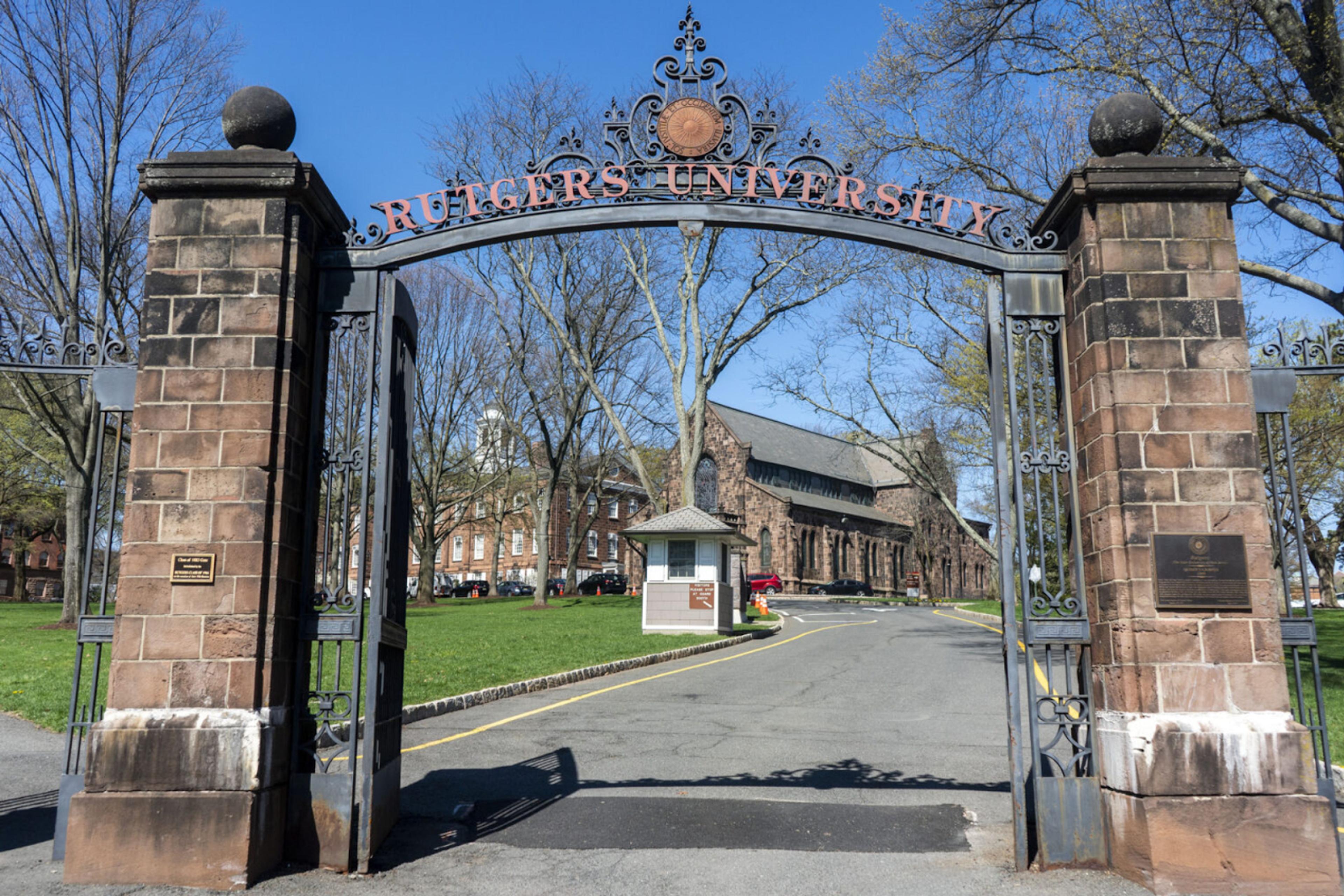How to Get Into Rutgers Law School (2024-2025)
Discover how to get into Rutgers Law School with expert tips, key statistics, and detailed insights into programs, tuition, and career outcomes. Discover yourself at Rutgers and learn how to stand out in the competitive application process.
Posted March 6, 2025

Table of Contents
Free Event

Featuring Indrani S.
Law School App Office Hours with a Former Stanford AdCom Member
Starting Thursday, April 17
11:30 PM UTC · 45 minutes

Featuring Indrani S.
How Hard is it to Get Into Rutgers Law School?
Rutgers Law School is widely recognized for its dedication to social justice and academic excellence, making it a prominent choice for aspiring legal professionals in New Jersey and across the country. Known for its diverse community and rigorous academic environment, Rutgers equips students with the skills and knowledge required to navigate the complexities of modern law.
For the JD Class of 2027, Rutgers Law received a high volume of applications from other schools, reflecting its status as a sought-after institution. The school maintains competitive standards, welcoming students with diverse backgrounds, experiences, and aspirations.
Applicants are evaluated holistically, with emphasis placed on a compelling personal narrative, strong academic performance, and a demonstrated commitment to the legal profession. Experiential learning opportunities allow students to work directly with practicing lawyers, thereby enhancing their legal skills and real-world experience.
This guide provides detailed strategies to help you craft a standout application and secure your place in to begin your transformative journey at Rutgers Law.
Rutgers Law School Admissions Statistics and Acceptance Rate
Academic Profile of Admitted Students
| Metric | 25th Percentile | 50th Percentile (Median) | 75th Percentile |
|---|---|---|---|
| GPA | 3.3 | 3.6 | 3.9 |
| LSAT | 155 | 158 | 161 |
Student Diversity and Community
Rutgers Law School values inclusivity and diversity:
- Students of Color: 48%
- Women: 59%
- Men: 39%
- First-Generation Students: 28%
These statistics reflect the school’s mission to create an inclusive environment to explore legal education and serve as a home for social justice. Additionally, Rutgers Law School offers comparative affordability compared to other schools in the region and provides strong connections to local job opportunities after graduation.
Rutgers Law School Acceptance Rates Over the Last Five Years
This trend highlights an increase in the school’s competitiveness wherever your legal education is and reflects the growing demand for a Rutgers Law education.
| Year | Acceptance Rate |
|---|---|
| 2020 | 43.5% |
| 2021 | 41.6% |
| 2022 | 41.1% |
| 2023-2024 | 38.9% |
Dates & Deadlines
| Binding Early Decision Program | Regular Decision |
|---|---|
| Round 1 Application Deadline: December 1 | Priority Deadline: March 15 |
| Round 2 Application Deadline: March 1 | Application Deadline: July 1 |
Admissions Requirements: Who Gets Into Rutgers Law School?
LSAT or GRE Scores
Applicants must submit either the LSAT or the GRE. Strong test scores, particularly in the LSAT range of 155–161, are recommended to remain competitive. While the LSAT is the preferred test for many, the GRE provides an alternative career path and discovery for those with different strengths.
Read: LSAT vs. GRE for Law School–Which to Take and How to Ace Both
GPA and Academic Rigor
A GPA of 3.6 or higher is ideal for applicants. Rutgers Law also considers the difficulty of your undergraduate courses and the reputation of your academic institution.
Letters of Recommendation
Submit at least two letters from professors, mentors, or professionals who can highlight your intellectual ability, work ethic, and leadership qualities.
Read: How Many Letters of Recommendation for Law School: A Comprehensive Guide
How to Strengthen Your Application to Rutgers Law School
1. Craft a Personal Statement That Aligns With Rutgers’ Mission
Your personal statement is your chance to show why Rutgers Law is the ideal school for your legal education. Highlight specific programs like the Rutgers Law Associates Fellowship Program or emphasize your commitment to pro bono and public interest work. Use clear examples from your experiences to connect your goals to Rutgers’ focus on social justice and practical training. Avoid generic statements and tailor your narrative to reflect how you can contribute to and benefit from the Rutgers Law community.
2. Showcase Relevant Experiences With Clear Impact
Demonstrate your readiness for law school by highlighting roles, internships, or academic projects where you showed leadership or achieved meaningful results. For example, if you contributed to research at faculty-led academic centers or gained experience in legal advocacy, provide specific details. Quantify your accomplishments when possible to make your impact clear, such as drafting legislation, increasing community engagement, or improving access to legal resources.
3. Highlight Unique Strengths That Differentiate You
Rutgers values applicants who bring diverse perspectives to the classroom. If you’re a first-generation college student, an international applicant, or pursuing a dual degree program, explain how your background equips you to excel at Rutgers. Detail how your life experiences have shaped your values and prepared you to contribute to the school’s inclusive environment.
4. Demonstrate a Commitment to Public Service
Rutgers Law has a strong emphasis on pro bono and public service work. Include specific examples of volunteer efforts or internships where you tackled community challenges or worked toward social justice. Whether you’ve assisted in legal aid clinics, participated in public policy initiatives, or supported marginalized communities, clearly illustrate how these experiences reflect your alignment with Rutgers’ mission.
5. Leverage the Timing of Your Application
Applying early in the admissions cycle gives you a strategic advantage. It ensures that your application will be reviewed while more spots are available. Plan to ensure all elements—transcripts, test scores, letters of recommendation, and essays—are polished and submitted well before the deadline. Early submissions show you’re proactive and serious about attending Rutgers.
Apply Here: Rutgers Law School Admission
Tuition and Financial Aid
Rutgers Law School offers a cost-effective education, especially when its tuition costs are compared to other law schools in the region. Rutgers Law School also provides specialized legal education tailored to different career paths, ensuring that students receive training that meets specific professional needs. Below is an accurate overview of tuition costs for the 2024-2025 academic year:
| Program Type | In-State Tuition | Out-of-State Tuition |
|---|---|---|
| Full-Time Program | $29,000 | $42,000 |
| Part-Time Program | $20,000 | $30,000 |
Scholarships and Financial Support
Rutgers Law is committed to making legal education accessible. The school provides a variety of scholarships based on merit, need, and other criteria. These include awards for academic excellence, leadership, and contributions to public interest work. Students are encouraged to apply early for scholarship consideration, as some funds are limited.
Loan Repayment Assistance Program (LRAP)
For graduates pursuing public interest careers, Rutgers offers a robust Loan Repayment Assistance Program. This program helps reduce the financial burden of student loans for those entering lower-salary fields, such as nonprofit work or government positions. The LRAP underscores Rutgers’ dedication to encouraging graduates to serve their communities without financial barriers.
Federal and State Financial Aid
In addition to Rutgers-specific scholarships and programs, students can apply for federal loans and state financial aid. Completing the Free Application for Federal Student Aid (FAFSA) early is recommended to maximize eligibility for grants, loans, and work-study opportunities.
Financial Planning Resources
Rutgers provides financial aid counseling and resources to help students manage their tuition and related costs. These services include workshops, budget planning tools, and one-on-one advising sessions to ensure students can make informed decisions about funding their education.
Why Choose Rutgers Law for Affordability?
Rutgers Law stands out compared to other schools for offering a high-quality education at a competitive cost. With flexible part-time and full-time program options, a range of scholarships, and robust financial aid support, Rutgers ensures that legal education is within reach for students from diverse backgrounds. The school's commitment to financial accessibility makes it a strong choice for future legal professionals.
Comprehensive Law School Resources
Need extra guidance? Access a library of resources, including example essays, resumes, and application prep materials, to strengthen your submission.
Unique Opportunities at Rutgers Law School
Rutgers Law School offers an array of opportunities designed to prepare students for successful legal careers while fostering a commitment to social justice and practical learning.
Specialized Programs and Certificates
Rutgers provides tailored pathways for students to gain expertise in various fields of law:
- Rutgers Law Associates Fellowship Program: This program offers hands-on training for recent graduates, allowing them to gain practical legal experience while contributing to their communities.
- Dual Degree Programs: Students can pursue a J.D. alongside another advanced degree, such as an MBA, Master’s in Public Policy, or other graduate programs, expanding career options.
- Certificate Programs: Designed for specialization, these programs provide students with diverse legal training and skills to meet the demands of specific legal sectors.
- Undergraduate Legal Studies: A pathway for undergraduate students to explore legal concepts and principles, laying the groundwork for future legal studies.
Commitment to Pro Bono and Public Interest Work
Rutgers Law is a leader in fostering a culture of public service and pro bono work. Students actively participate in programs that:
- Serve communities within some of the largest legal markets in the country.
- Address pressing societal challenges, contributing to justice reform and advocacy.The school’s dedication to public interest law underscores its mission to prepare students to make meaningful contributions to their communities.
Experiential Learning
Rutgers emphasizes practical legal training through real-world experiences:
- Clinics and Externships: Students gain hands-on experience in various areas, including family law, immigration law, and criminal justice reform.
- Mock Courtrooms: Students refine their advocacy skills by participating in realistic courtroom simulations, including settings designed to replicate modern legal environments.
- Global Perspectives: Opportunities such as the Africa classroom with student presentations help students engage with international legal challenges and expand their cultural competency.
Strong Career Outcomes
Rutgers Law prepares graduates for success in diverse career paths, consistently delivering strong employment outcomes:
- 92% of students are employed after graduating, with many securing roles in top law firms, public service organizations, and academic institutions.
- Prime Location: Situated in New Jersey, Rutgers offers access to some of the largest and most dynamic legal markets, including New York City, Philadelphia, and Washington, D.C.
- Supportive Career Services: Rutgers provides dedicated career counseling, networking opportunities, and alumni support to help students achieve their professional goals.
5 Expert Tips on How to Get Into Rutgers Law School (2024-2025)

- Leverage Rutgers’ Pro Bono Commitment in Your Application
Rutgers Law has a strong emphasis on public service and social justice. Highlight your involvement in volunteer work, internships, or initiatives that show your dedication to making a difference in underserved communities. Specific examples, such as leading a project to provide legal aid to low-income individuals or organizing advocacy campaigns, resonate with the admissions committee. Additionally, mention how Rutgers’ pro bono and public interest programs align with your career aspirations. - Focus on Faculty-Led Academic Centers and Specialized Programs
Tailor your application to reflect your interest in Rutgers’ unique academic opportunities, such as its faculty-led academic centers or certificate programs providing specialized legal education. Research these areas beforehand and discuss how their groundbreaking scholarship and innovative approaches match your legal interests. This shows you’ve done your homework and are genuinely interested in Rutgers as your top choice. - Show How You’ll Thrive in a Diverse and Inclusive Environment
Rutgers values diversity and inclusion. Whether you’re a first-generation college student, from an underrepresented community, or have unique personal experiences, clearly connect your story to how you’ll contribute to and benefit from the school’s inclusive environment. For example, discuss how your background has shaped your perspective on law and why Rutgers’ mission resonates with your values. - Strengthen Your Application With Evidence of Growth
If there are any weak spots in your academic or professional record, use an addendum to address them. Be concise and factual—focus on how you’ve grown since and what steps you’ve taken to strengthen your readiness for law school. Highlight improvements, such as raising your LSAT score, pursuing challenging coursework, or gaining valuable professional experience. - Prepare for Your Interview Like a Legal Advocate
Rutgers may invite candidates for interviews to further assess their fit for the program. Treat this as an opportunity to showcase your advocacy skills. Be prepared to articulate your reasons for choosing Rutgers, your career goals, and how you’ve demonstrated leadership, resilience, and intellectual curiosity. Practice speaking concisely and confidently about your achievements, as this will leave a strong impression on the admissions committee.
Get Expert Support for Your Law School Application
Crafting a strong application can feel overwhelming, but you don’t have to do it alone. Work with an expert admissions coach to get personalized feedback on your personal statement, resume, and overall strategy. Learn more about working with a coach here.
Common Questions About Rutgers Law School
Is Rutgers Law a good law school?
- Yes, Rutgers Law is highly regarded for its commitment to public service, academic rigor, and inclusivity. It is one of the most affordable law schools in the region and offers unique programs, including faculty-led academic centers, pro bono opportunities, and dual degree options. Rutgers Law is well-positioned in New Jersey, providing access to some of the largest legal markets and offering a diverse learning environment.
What LSAT score do I need for Rutgers Law?
- To be competitive for admission to Rutgers Law, aim for an LSAT score in the range of 155 to 161. The median score for recent classes is approximately 158, but a higher score will strengthen your application, especially when combined with a strong GPA, personal statement, and relevant experiences.
Is Rutgers Law School hard to get into?
- Rutgers Law is moderately selective, with an acceptance rate typically ranging between 20% and 25%. While the admissions process is competitive, applicants with a compelling personal narrative, strong academic credentials, and relevant legal or public service experience have a solid chance of acceptance.
The Bottom Line
Applying to Rutgers Law School is a significant step in pursuing your legal career. To stand out, focus on aligning your story with Rutgers’ values, such as their commitment to pro bono work, social justice, and creating an inclusive environment. Highlight your unique experiences, demonstrate academic and professional growth, and make your case with confidence in every part of your application.
Whether you’re drawn to Rutgers’ faculty-led academic centers, dual degree programs, or the opportunity to gain practical skills in one of the largest legal markets, your application should show why you’re a great fit for their community. Every detail, from your personal statement to your recommendation letters, should work together to tell a clear and compelling story.
Related Articles:
- The Top 10 Hybrid JD Programs
- The Top 10 Accelerated JD Programs
- T14 Law Schools: Acceptance Rates & Class Profiles
- How Many Law Schools Should You Apply To?
- LSAC Credential Assembly Service (CAS): What it Is and How It Works for Law School Applications
- A Guide to 2L: Your Second Year at Law School
- The Top 10 Law Schools for Policy and Legislative Affairs










